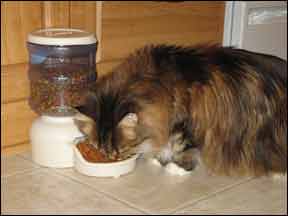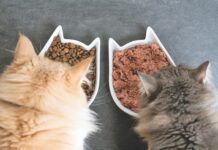Over the past half-century or more, the American pet food industry has worked hard to provide nutritionally sound, affordable and readily available canned and dry cat food.

288
The nutritional contents of these foods are based on the nutrient requirements of cats as published by the National Research Council and/or the Cat Food Nutrient Profiles recommended by the Association of American Feed Control Officials (AAFCO). The feed control officials of the various states and the U.S. Food and Drug Administration monitor the quality of all commercial cat food products.
Despite this estimable track record, however, some cat owners still firmly believe that they can do a better job than the pet food industry by creating their own diets.
Unfortunately, a homemade diet that is not nutritionally complete can result in a wide variety of disorders that can have serious consequences if ignored. Simply put, the best choice for a complete and balanced diet for the healthy cat is a commercial product that can be found in grocery stores and pet supply shops, according to Joseph J. Wakshlag, MS, DVM, PhD, assistant professor of clinical nutrition at Cornell University’s College of Veterinary Medicine.
“Based on a study in the British Journal of Nutrition, relatively few pet owners are able to reliably create a homemade diet without potential deficiencies or excesses in the diet. Roughly 60 percent of Europeans prepared them with evidence of improper balance. and we assume the same is true here in America. The problems with improperly balanced meals generally impact the skin, bone and the GI tract.”
Seek Expert Information. “At Cornell, we create diets for animals with certain health conditions — like skin or food allergies, or urinary tract problems — and these diets are specifically deficient or abundant in certain nutrients to help deal with a problem,” says Dr Wakshlag, who is board-certified by the American College of Veterinary Nutrition. “This is our approach after the animal did not respond to therapeutic foods. Sometimes the homemade diet helps, and sometimes it doesn’t. It’s about 50/50. We don’t emphatically say that people can’t feed raw or homemade diets — but we don’t recommend it for the average healthy pet.”
If you’re still inclined to prepare your pet’s meals at home — and you are certain that you have both the time and the true commitment required to proceed — it’s imperative that you first consult with your pet’s veterinarian or a veterinary nutritionist. You will need to become as knowledgeable as possible about feline nutritional needs. An appropriate diet must provide the proper amounts as well as a proper balance of proteins, minerals, fats and vitamins, and scientists have devoted decades to establishing the optimal balance.
Vitamins are water- or fat-soluble organic substances that exist naturally in plant and animal foods and are needed in small amounts for the growth and normal functioning of the feline body. For example, a vitamin A deficiency can retard bone development and cause eye disorders, lack of coordination, brain damage and other serious health issues. On the other hand, an excess of this important vitamin can cause bone deformities, liver disorders, neurologic dysfunction and other problems.
Another example: Proteins, which are major components of the supporting structure in a cat’s body — the muscles, ligaments and tendons, for example — are composed of chains of smaller chemical compounds called amino acids. A cat’s body needs about 20 different amino acids in order to function properly. Half of these can be synthesized within the body, but the remainder — the essential amino acids — cannot, and thus must be provided in the diet. Several decades ago, a serious deficiency of the amino acid taurine was identified in the feline population. Taurine deficiency was responsible for serious diseases of the heart, eyes and reproductive system. This problem almost never occurs among domestic cats today, however, since cat food manufacturers now supplement their products with adequate amounts of taurine.



